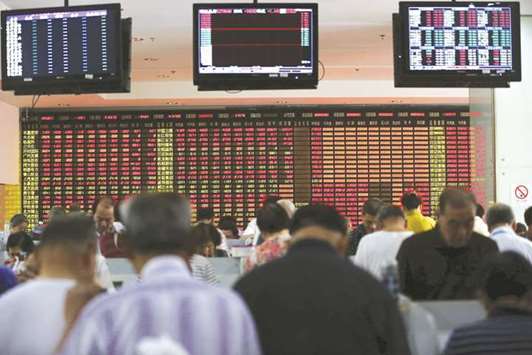Chinese investors flocked into money-market products at a rate outpacing equities and bonds last quarter, adding to what is already the biggest segment of the nation’s mutual fund industry.
Mutual funds investing in low-risk, short-term debt instruments grew 5.4% last quarter to 7.7tn yuan ($1.1tn), compared to the 3.7% increase in bond funds and a drop of 1.3% in equity funds, data compiled by the Asset Management Association of China show.
After a shadow banking crackdown shrank the pool of investment products in China, money market funds are seen as a safer investment as trade war uncertainties weigh on stocks, while offering returns close to those of bonds.
While Chinese equities have rebounded from their lows and corporate notes jumped last month amid a government shift toward easing, analysts say money-market funds will continue to be attractive to retail investors.
“Money market funds offer high risk-adjusted returns and provide good liquidity to retail investors,” said Huang Li, a Shanghai-based fund analyst at Fitch Ratings.
“Annualised returns of around 4%, against the backdrop of poor performances in stocks and bonds this year, is very attractive. This relative value isn’t likely to change much for the rest of the year.”
China’s money-market funds have nearly doubled in size from 2016, making it the world’s second-largest market behind the US, according to UBS Asset Management.
Money-market funds accounted for 61% of the nation’s mutual funds at the end of June, data from the association showed, with China International Capital Corp estimating individuals account for more than half of that investment. Money market funds account for just 12% of mutual funds globally, according to Fitch.
China’s draft rules to regulate banks’ issuance of wealth management products, issued last month as part of a crackdown on the nation’s shadow-banking industry, is also helping to shift cash to the more traditional mutual funds.
The Politburo meeting held on Tuesday reaffirmed the continuation of the campaign. And with stocks entering a bear market and surging bond defaults hitting some portfolios hard, money-market funds have emerged as one of the few viable options for investors.
“There’s not a lot of derivatives in the onshore market,” said Hayden Briscoe, Asia Pacific head of fixed income at UBS Asset Management in Hong Kong. “What happens is when you get these selloffs, particularly in credit or in equities, there’s no derivative instruments to hedge. Everybody is a physical trade so they just dump and they move their cash.”
The Shanghai Composite Index declined 1.8% yesterday, the most in a month, while the yield on 10-year sovereign bonds fell one basis points to 3.48%.
Money market funds’ falling returns last quarter didn’t deter investors from buying them, reflecting the demand for safety amid global uncertainties and volatility.
The average yield of such funds tumbled 34 basis points to 3.85%, according to CICC, as the central bank cut the reserve requirement ratio and stepped up injections via the medium-term lending facility, driving the seven-day repurchase rate - where many money-market funds refer to as the benchmark - to the lowest since February 2017.
The world’s top money market fund, Yu’EBao, marketed by Alibaba Group Holding’s Ant Financial affiliate, saw record outflows in the second quarter in the wake of efforts to control its expansion.
Funds flowed into rival money market funds as competitors picked up the lost market share. Assets under management for Bosera Cash Income Fund jumped to 147bn yuan at June-end from 3bn yuan in March.
“The trend is likely to continue as smaller funds take up outflows from Yu’EBao amid the regulatory curbs,” said Luo Yunfeng, Beijing-based head of fixed-income research at Essence Securities Co. “It looks like one of those ‘cash is king’ periods, and hence money-market funds maybe the best of type of assets to hold.”

Investors look at computer screens in front of an electronic board showing stock information at a brokerage house in Shanghai (file). Chinese investors flocked into money-market products at a rate outpacing equities and bonds last quarter, adding to what is already the biggest segment of the nation’s mutual fund industry.
